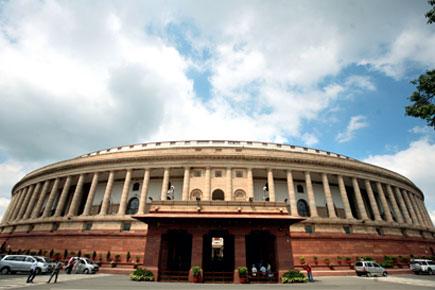 New Delhi, Sep 7: The rules of the game have changed for the political class, with the Supreme Court asking the government on Friday to enforce its order for immediate disqualification of sitting MPs, MLAs and MLCs convicted for an offence attracting a sentence of two years.
New Delhi, Sep 7: The rules of the game have changed for the political class, with the Supreme Court asking the government on Friday to enforce its order for immediate disqualification of sitting MPs, MLAs and MLCs convicted for an offence attracting a sentence of two years.
"Sitting Members of Parliament and state legislators are no longer protected by clause 4 of Section 8 of the Representation of People Act," a decree issued by the SC said, spelling the extinction of the law which allowed convicted lawmakers to hold on to their seats during pendency of their appeals. The Centre was in the process of relaying the new reality to all state capitals.
The blow to tainted legislators was compounded as the anticipated antidote through a change in law to allow convicted MPs and MLAs to retain their membership pending an appeal failed to materialize in the face of BJP's last-minute resistance in Parliament.
This means that any lawmaker convicted from now for an offence punishable with a sentence of two years or more will be immediately unseated, and will be barred from contesting elections for at least six years. This could be longer, depending on the term of the sentence awarded.
In fact, the sting could be sharper for convicted MPs, MLAs and MLCs. For, while they lose their elected post on conviction, they will be no compensation for the years lost if they are acquitted. Further, those who get convicted closer to election may have to sit out more than one election, given the slow pace of judiciary.
Public censure made parties change tune
The scuttling of the RP Act amendment is a second setback to the political class in as many days. On Thursday, amendments to the Right to Information Act designed to exclude political parties from the ambit of the transparency law had to be referred to a standing committee in the face of similar political opposition.
Just as in the case of the amendment to the RP Act crafted to nullify the SC order for disqualification of convicted lawmakers, the amendment to the RTI Act had seemed set to go through when the fear of
popular opprobrium unravelled the consensus for preserving the status quo. Congress circles claimed that besides resistance from the opposition, Congress vice-president Rahul Gandhi's reservations were also a factor.
The re-think 24 hours ago and the reluctance on Friday to pursue the RP Act amendments reflect a new sensitivity to concerns that political parties have often dismissed as elitist, and limited to activists, the commentariat or a slice of middle-class India that they did not see as a significant or enthusiastic vote bank. Political circles wondered whether the developments over the last 48 hours marked a recognition, if grudging, among a section of the political class that there is a political cost attached to going against the grain of public opinion.
The proposed amendment to the RP Act fell through on Friday morning amid considerable drama as BJP said the proposal was bad in law and constitutionally invalid.
BJP leaders said the party — which fancies its prospects among the urbanized classes — does did not think it prudent to support amendments that risked being seen as a self-centred effort of the political class to protect criminals in its ranks.
The party stuck to its position despite feverish lobbying by at least one senior politician who is apprehensive of the outcome of his trial in a famous graft case.
BJP leader Arun Jaitley argued that disqualification of a legislator was provided for under Article 102 of the Constitution and any move to merely change the RP Act would not do.
Law minister Kapil Sibal said the BJP decision introduced a new calculus in arguments dealing with the SC order that went against a broad agreement that prevailed in Parliament.
But faced with BJP's determined opposition, with other parties like BJD also expressing doubts, the government had no option but to put aside its plans to move the amendment to the RP Act.
The government's decision reflects a hesitation to push against both the political opposition and the wider perception that UPA-2 has been lethargic in acting against corruption. Congress managers are wary of seeming impervious to popular sentiment at a time when the party is combating the fallout of a series of scams ranging from Commonwealth, 2G and Coalgate.






Comments
Add new comment